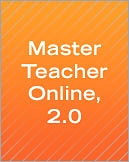
Elsevier: Master Teacher Development Process Online, Version 2.0 (Course), 1st Edition
Online Course

Now $50.30
Some content has been removed from this site because Flash is no longer supported on web browsers.
-
Faculty receive a certificate of completion after each completed module, At the end of the course, upon completion of the course post-test, users will receive a certificate of completion.
-
Module 1: Defining Good Teaching
Learning Objectives:
- Explain how your reasons for teaching influence student success in the classroom.
- Define key components of good teaching.
Module 2: Planning a Class
Learning Objectives:
- Recognize the importance of planning.
- Identify ways to effectively plan a class.
- Compare and contrast the various teaching techniques.
- Utilize a planning checklist.
Module 3: Fundamentals of Classroom Success
Learning Objectives:
- Explain how the teacher creates the learning environment in the classroom.
- Determine how the classroom environment influences student participation.
- Identify behavior in the classroom that might hinder the learning process.
- Identify ways that a student can have a win-win learning experience in the classroom.
- List actions that can help establish classroom control.
- Recognize appropriate strategies to deal with disruptive student behavior.
- Describe interventions to re-establish classroom control.
Module 4: Questioning Techniques to Keep Students Engaged
Learning Objectives:
- List reasons for asking questions.
- Indicate how to select students to respond.
- List the different forms questions can take.
- List the characteristics of a good question.
- List strategies for effective classroom questioning.
- Define Bloom's Taxonomy.
- Outline the six levels of learning in Bloom's Taxonomy.
Module 5: Defining Critical Thinking
Learning Objectives:
- Explain why critical thinking is so important for both teachers and students.
- Identify how previous knowledge can help and hinder the understanding of new information.
- Describe ways a teacher can assess students' critical thinking skills.
- Explain the role that values, assumptions, and opinions play in students' processing and evaluating what they learn.
- Explain the characteristics of critical and non-critical thinkers.
Module 6: Engaging Students with Different Learning Styles NEW!
Learning Objectives:
- List the three major learning styles.
- Compare and contrast teaching methods that will appeal to a variety of learners with different styles.
Module 7: Developing Professionalism NEW!
Learning Objectives:
- Explain the different views on professionalism.
- Identify personal beliefs about professionalism.
- Develop strategies to encourage professionalism and caring in students.
Module 8: Assessing Learning Outcomes and Evaluation NEW!
Learning Objectives:
- Describe strategies for grading papers and projects.
- List principles of writing good test questions.
- Identify strategies for analyzing test results.

 as described in our
as described in our 